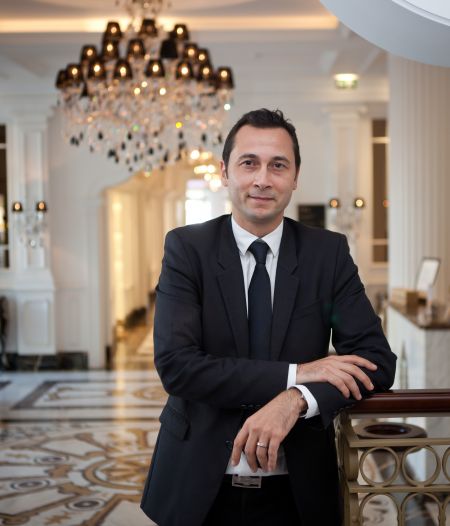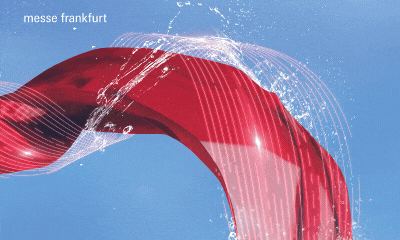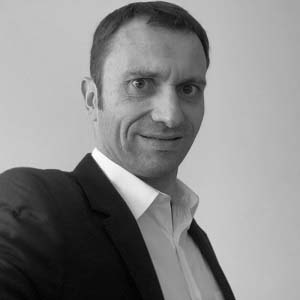 |
INTERVIEW - ÉRIC VIALE: "OUR JOURNEY TO TOMORROW PROGRAMME INTENDS TO HAVE A POSITIVE IMPACT ON THE LIVES OF 30 MILLION PEOPLE"
The IHG Group already has a strong social commitment through a number of actions aimed at its teams or benefiting societal causes. It is now stepping up and developing this policy, which is proving increasingly successful internally and whose benefits are felt by everyone. |
Catégorie : Monde - Carrières
- Interviews et portraits
- Carrière - Interviews
Interview de Guillaume Chollier le jeudi 28 décembre 2023
 Éric Viale is Managing Director of Southern Europe for the IHG Group.
Crédit photo © IHG Hotels & Resorts
While recruitment has made particular progress in recent months, enabling the group's properties to operate without having to reduce their capacity, IHG has also worked hard to promote the corporate culture within its workforce. The group has also put in place a number of measures to promote and develop staff, in order to retain them within the company.
IHG has also introduced regular meetings, sometimes hosted by the CEO, training courses on well-being in the workplace and working groups, thus encouraging exchanges between all parts of the company. Finally, the hotel group has put the emphasis on mentoring, a practice that was already strongly encouraged, and has developed its corporate social responsibility policy by committing, with its teams, to working towards carbon neutrality and through actions designed to have a positive impact on the lives of others.
Journal des Palaces: Where are you today in terms of recruitment?
Éric Viale: Not everything is settled at this stage because historically, there have always been vacancies. But, compared with our last meeting, we no longer have to deal with hotels having to cap their capacity, their number of rooms open for booking, as was sometimes the case when the pandemic was over. As a result, we are now able to find the manpower we needed and which we may have lacked yesterday.
We are working on several fronts in this area. Firstly, we are working on our corporate culture to ensure that it reflects the expectations of people who want to work in the hotel industry. For us, it's essential that these potential candidates feel valued, particularly through the diversity of their backgrounds and profiles that we integrate into the hotels. We also intend to give everyone the opportunity to grow within the company.
To this end, every year we carry out employee satisfaction surveys in all our hotels, as well as at head office, at corporate level. We had an 86% commitment rate, up on the previous year, and we were among the best employers in the world, according to the organisation responsible for carrying out this benchmark.
How do you ensure that your employees are satisfied?
Our leaders and general managers are also there to pass on this culture. We have also invested heavily in social media, as part of our recruitment campaigns. By investing slightly more and improving our visibility tools and our way of communicating, we are now registering more than 80,000 monthly visits to our job sites. That's a clear increase.
We have also trained our teams in recruitment methods, including diversity. We now take on people from outside the hotel industry, or who were not initially destined to join the sector because they had not studied in this area. So today, we also recruit on personality, on a candidate's potential, and not just on their experience in the sector.
We have also relaunched our 'employer brand', which is based on three themes (see our article of 24 May): 'Room to Grow', which offers our employees the opportunity to grow within the company; 'Room to Make a Difference', which represents this responsible side and the way in which we can make a difference in the environment, in the communities; and finally 'Room to Belong', which symbolises this feeling of belonging, including diversity and inclusion.
When you join IHG, you join a family that embraces these values. We have, of course, translated these three principles into our training courses. All this contributes to this culture of inclusion.
What new challenges are GMs facing as travel patterns change?
I'm extremely proud of our GMs and extremely grateful for their work. They are true business leaders, who give their all for their unit. During the periods we've been through, they've demonstrated their resilience, adaptability, innovation and creativity. We truly have superb leaders in our hotels.
Now, yes, there are still a few difficulties. Recruitment has not been easy in recent years. But the initiatives of these GMs and their innovations are gradually helping to overcome these difficulties. We are now welcoming a generation Z who have different expectations of what a job is and what a company is. GMs therefore need to get to grips with all these changes and ensure that the corporate culture also allows for diversity and profiles that are a little different from those we have had until now.
The new generations of consumers also have different expectations, mainly based on experience. And, from a commercial point of view, the GM is also the guarantor not only of the experience, but also of the performance of his hotel. This environment is changing fast: there is, for example, increasing talk of the role that ChatGPT will play in the hotel industry. So we need to think about how to integrate this new situation. The environment around these GMs is very dynamic, and that makes the role of a general manager today much more complex. What's more, this role has become much more comprehensive than it used to be. But, in my opinion, that makes the job more fulfilling.
Once you've attracted this talent, what do you do to keep it within the company?
As part of 'Room to Grow', which we have just mentioned, we have specific dedicated programmes that enable our employees to project themselves and receive support in developing their careers. There is, for example, the Journey to GM programme, which is aimed at heads of department who really have the potential, the desire and the ambition to become, one day, Chief Executive Officer. And, considering the Group's growth and development, which we have discussed, we will need these managers in the future.
We also have the "Rise Programme", which will support the female leaders of tomorrow. The idea is really to help our female staff overcome the obstacles and difficulties they may encounter when they want to grow and land a leadership position.
Today, 200 people have already gone through these programmes, with real examples of employees who have gone on to become GMs. And we currently have 140 employees following these programmes. This underlines IHG's real desire to provide them with all the tools they need to grow, develop and support them over the long term within the Group.
IHG was a pioneer in the field of well-being at work. Where do you stand today?
It's something we launched quite a while ago. In the same vein as our desire to create a community with all our employees, we organise regular and direct communication. For example, our global CEO regularly holds 'Town Halls' or meetings where everyone can get in touch. At the leadership level in Europe, and even at my level, we talk a lot and regularly so that everyone understands what the company's strategy is, what role each of us can play and what opportunities are open to each of us.
In addition to well-being, we have worked hard on training courses on well-being at work, good practice, advice, etc. We also have a support portal for our employees. This can be useful for solving a one-off problem, financial or otherwise, or for providing support via dedicated psychological resources, for example. This portal works very well and is used a lot. In particular, it is proving very useful to our employees working on sites that are affected by unusual events, such as natural disasters.
Finally, we offer Employee Resource Groups (ERGs). These are working groups of employees who share a particular interest. The environment, education and inclusion help to create communities within the Group and enable us to make progress on specific issues.
What new measures have you introduced in terms of onboarding and offboarding?
All the initiatives and the whole culture we have just mentioned are part of our onboarding policy. They are all the more important as not all the recruits we take on are necessarily from the hotel industry.
Not in general, but depending on the position, we can offer mentoring, cross-exposure and so on. We work and build with people who are already in place, which helps us to welcome new employees. A mentor is all the more useful because we can ask them questions that we wouldn't normally dare to ask within their own organisation. And for those involved in mentoring or cross-exposure, it has a real meaning: integrating individuals, helping them to grow... So it's a win-win situation. It works very well.
We sometimes apply these measures when opening hotels: various talents go to help the team in place to better understand IHG so that it can be operational more quickly. This works perfectly and is rewarding for both parties.
Have you stepped up this mentoring policy?
Mentoring is something that's close to my heart because I believe that all of us, at one time or another in our careers, have met someone who, through discussion or advice, has unblocked things and enabled us to grow. We have made progress on this theme, in the sense that we have identified our talents at all levels of the hotels. We've started to dig deeper into the organisation of the hotel to identify all the people who have this talent, this potential and this desire. As a result, we now have a much wider scope of people whom we are going to help to grow in their careers.
For me, this mentoring role is always interesting because you're talking to someone who's listening, and together we're trying to resolve a blockage so that we can accelerate. With the increase in the number of our talents and the people we work with, we have divided up the people we are going to mentor at team level. It's working very well, we're getting excellent feedback, and it's part of the Journey to GM or Rise programmes.
In Southern Europe, I want us to be very clear about identifying people who want to continue to grow with us, who have the potential to do so. So that we can allocate them a mentor to help them grow.
You are a mentor yourself. Can you give us some specific examples of the advice you give?
What's interesting about mentoring is that, in reality, it's the person who takes us where they're having difficulties. Currently, I have several people for whom I'm a mentor, but I don't give them the same help on the same subjects. We often come across impostor syndrome, where people have grown up and become heads of department, but they're wondering: "Should I really be here?"
For a mentor, it's really interesting because you have to rebuild self-confidence. You have to be very clear and point out the mistakes that may have been made, pointing out that we all make mistakes, that there are things we can't master but that we have to grow and work on, and that's what makes a career. It's also important to emphasise that if someone has got to where they are, it's because they have a great deal of ability.
I've found that listening often helps people to find their own solutions. The only problem that is difficult to resolve is a relationship problem with one's line manager or with someone in the team.
What direction is the IHG Group taking regarding its social responsibility?
We are continuing to implement our 10-year action plan, "Journey to tomorrow". As far as the planet is concerned, we said that we would build hotels and new constructions with a zero carbon emissions objective. We signed the first Voco Exeter hotel in England, which was designed and thought through in terms of construction and operation to achieve carbon neutrality. We are continuing this work alongside major engineering firms. We are also continuing to measure our energy performance in order to reduce it, we are making progress on renewable energy, we are reducing the use of plastic, etc.
As far as the community is concerned, September was 'Giving for Good' month: a month during which all our employees, hotels and corporate bodies will be taking action to support the communities. So, this year, we focused on food distribution. With the Paris Corporate office, we went to Secours Populaire, where we received food donations that we put on the shelves and then distributed. Some of my staff went out on patrols and distributed meals.
Our "Journey to tomorrow" programme intends to have a positive impact on the lives of 30 million people, through themes such as education, for example. Our teams took action almost every day. There's a lot to be gained from it because it's touching, it's moving. And, in the end, apart from doing good for others, I think we also do a lot of good for ourselves. And it proves that IHG is committed to making a difference.
When we choose an employer, we need the company's values to be not just words, but deeds and facts. At IHG, for example, head office employees now have two days a year that they can allocate to community work. On the one hand, not all companies do this, and on the other, we are finding that more and more employees are using these two days. This allows IHG to have a very positive impact on communities. It's really rewarding.
|
|







